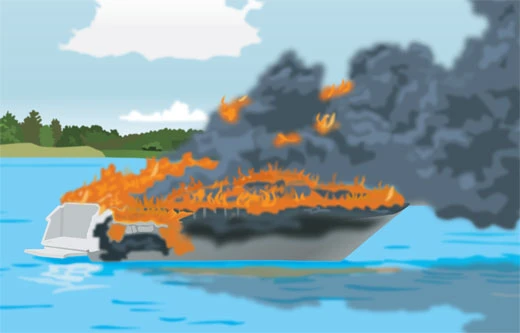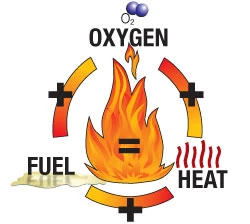
(image provided courtesy of boat-ed.com)
What should you do if a fire breaks out in the front of your boat? Get the answers you need in this free boating test guide
If a fire breaks out in the front of your boat, it’s crucial to act quickly and effectively to prevent further damage and ensure everyone’s safety. In our comprehensive boating test guide, we provide you with the best and most up-to-date information on how to handle emergencies like when your boat is on fire. Whether you’re preparing for a boating test or seeking essential knowledge as an experienced boater, our guide has you covered with the answers you need to know.
Table of Contents
- What should you do if a fire breaks out in the front of your boat?
- What should you do immediately if a boat motor catches fire?
- What should you do if a fire breaks out in the back of your boat?
- What should you do if the motor on your boat catches fire?
- What must you do when underway and a fire starts?
- What type of fire can be put out safely with water?
- What should you do if a fire breaks out in the front of your boat?
- What should you do immediately if a boat motor catches on fire?
- Check out our other study guides for boating test questions:
- Getting Certified: Passing your boat exam
What should you do if a fire breaks out in the front of your boat?
If a fire breaks out in the front of your boat, follow these steps:
- Alert everyone on board and ensure they put on life jackets.
- Move all passengers to a safe location, preferably at the back of the boat.
- Turn off the engine and any fuel sources to prevent the fire from spreading.
- Attempt to extinguish the fire using a portable fire extinguisher if it is safe to do so and you are trained in its use. Aim at the base of the flames and sweep from side to side.
- If the fire is too large to control or spreads rapidly, evacuate the boat immediately and move to a safe distance.
- Use visual distress signals or a marine radio to call for help and alert nearby vessels of the emergency.
Remember, safety should always be the top priority in any emergency situation, especially if there is fire on your boat. Immediate action is crucial to ensure the safety of everyone on board and prevent further damage if your boat is on fire.
What should you do immediately if a boat motor catches fire?
If a boat motor catches fire, swift action is essential to ensure the safety of everyone on board and prevent the fire from spreading. Interested in what should you do immediately if a boat motor catches fire, then follow these steps to address your boat motor fire:
- Alert all passengers on board and instruct them to put on life jackets.
- Shut off the fuel supply to the engine and turn off the ignition to prevent fuel from feeding the fire.
- Activate the boat’s fire suppression system if available and if it is safe to do so.
- Use a fire extinguisher to attempt to extinguish the flames if it is safe and you are trained to use it. Aim at the base of the fire and sweep from side to side.
- If the fire cannot be controlled quickly or continues to spread, evacuate all passengers from the boat to a safe location.
- Use visual distress signals or a marine radio to call for help and alert nearby vessels of the emergency.
Always prioritize safety and follow proper procedures when dealing with a boat motor fire. Quick action and clear communication can prevent a boat fire from spreading. This is a likely test question on your boater exam, so keep an eye out for similar phrasing and tricky wording. The question what should you do immediately if a boat motor catches on fire is a common one. What should you do immediately if a boat motor catches on fire? Take immediate and decisive action. Communicate the danger, and immediate stop the engine.

(image provided courtesy of boat-ed.com)
What should you do if a fire breaks out in the back of your boat?
If a fire breaks out in the back of your boat, act swiftly to ensure the safety of everyone onboard and prevent the fire on your boat from spreading. What should you do if a fire breaks out in the back of your boat? Take these steps immediately:
1. Alert all passengers on board and instruct them to put on life jackets immediately.
2. Move all passengers to the front of the boat to create distance from the fire and avoid inhaling smoke.
3. If it is safe to do so, attempt to extinguish the fire using a fire extinguisher. Aim at the base of the flames and sweep from side to side.
4. If the fire cannot be controlled quickly or continues to spread, evacuate all passengers from the boat to a safe location.
5. Use visual distress signals or a marine radio to call for help and alert nearby vessels of the emergency.
Remember to prioritize safety above all else and follow proper procedures when a boat is on fire. If a fire breaks out in the back of your boat, clear communication is key. Knowing what should you do if a fire breaks out in the back of your boat is an important for passing your boat test and keeping yourself safe on the water.
What should you do if the motor on your boat catches fire?
Wondering what should you do if the motor on your boat catches fire? If the motor on your boat catches fire, follow these steps to ensure the safety of everyone on board and minimize the risk of boat fire damage:
- Immediate Action: Shut off the engine immediately to cut off the fuel supply to the fire.
- Alert Passengers: Inform all passengers on board about the fire and instruct them to put on life jackets without causing panic.
- Access Fire Extinguisher: If it is safe to do so and the fire is small and manageable, retrieve a fire extinguisher and aim it at the base of the flames. Sweep from side to side until the fire is extinguished.
- Evacuate if Necessary: If the fire cannot be controlled quickly, or if it continues to spread despite extinguisher use, evacuate all passengers from the boat to a safe location. Use visual distress signals or a marine radio to call for help and notify nearby vessels of the emergency.
- Do Not Open Engine Compartment: Avoid opening the engine compartment if it is engulfed in flames, as this can fuel the fire and cause it to spread rapidly. Instead, focus on evacuation and seeking assistance from nearby vessels or authorities.
- Monitor the Situation: Even after the fire is extinguished, closely monitor the engine compartment for any signs of reignition or smoldering. Be prepared to use additional fire extinguishers or take further action if necessary.
- Seek Professional Assistance: Once the situation is under control and everyone is safe, seek professional assistance to assess any damage to the boat’s engine and ensure that it is safe to operate.
Always prioritize safety and take swift and decisive action if the motor on your boat catches fire. When dealing with a boat motor fire, immediate action and alerting passengers are the first priority.
What must you do when underway and a fire starts?
When underway and a fire starts on your boat, you must follow these essential steps to ensure passenger safety and minimize damage from the boat fire.
- Alert Everyone On Board: If there’s a fire on your boat, Immediately notify all passengers about the fire. Use clear and calm communication to avoid panic and ensure that everyone is aware of the emergency.
- Stop the Boat: If it is safe to do so, bring the boat to a controlled stop. This can help prevent the fire from spreading and provide a stable platform to address the emergency.
- Access Fire Extinguishers: Locate the fire extinguishers and aim at the base of the flames. Spray the extinguishers using a sweeping motion until the fire is fully extinguished. If the fire cannot be controlled with extinguishers, proceed to the next step.
- Activate Bilge Blower: If the fire involves the engine compartment or fuel sources, activate the bilge blower to ventilate flammable gas and reduce the risk of explosion.
- Initiate Emergency Procedures: Implement the emergency procedures outlined in your boat’s safety plan. This likely includes using distress signals, deploying life jackets, and preparing to abandon ship if necessary. Assign specific roles to passengers to help coordinate a response.
- Evacuate if Necessary: If the fire cannot be controlled or extinguished, or if conditions become unsafe, initiate an orderly evacuation of all passengers. Transfer everyone to a designated safe area on the boat or prepare to abandon ship if required.
- Use Emergency Communication: Use marine VHF radio, distress signals, or other communication devices to alert nearby vessels, authorities, and search and rescue services about the emergency situation. Provide your location, nature of the emergency, and the number of individuals on board.
- Monitor the Situation: Continuously assess the situation and monitor for signs of fire reignition, smoke, or other hazards. Be prepared to take additional actions as needed to ensure the safety of everyone on board.
- Seek Professional Assistance: Once the fire is extinguished or under control, seek professional assistance to assess any damage to the boat, address safety concerns, and arrange for towing or repairs if necessary.
By following these steps and prioritizing safety, you can effectively respond to a fire emergency while underway and protect the lives of those on board.
What type of fire can be put out safely with water?
If your boat is on fire, Class A fires, which involve ordinary materials like wood, paper, cloth, and some plastics, can be safely extinguished with water. This type of fire leaves behind ashes when extinguished. Use water to cool the burning material, remove heat, and smother the flames. However, it’s a fire…so use caution and assess the situation carefully, especially when dealing with flammable liquids, electrical equipment, or cooking oils, as water may not be safe and could make the fire worse.
What should you do if a fire breaks out in the front of your boat?
If you’re wondering what should you do if a fire breaks out in the front of your boat then follow these steps to ensure the safety of everyone on board:
- Alert Passengers: Quickly alert everyone on board about the fire. Ensure they put on life jackets immediately.
- Turn Off the Engine: Shut off the boat’s engine to prevent the fire from spreading due to fuel or electrical sources.
- Position the Boat: If possible, position the boat so that the fire is downwind. This helps to prevent the flames and smoke from blowing toward you and the passengers.
- Use a Fire Extinguisher: Grab the nearest fire extinguisher and aim it at the base of the fire. Use a sweeping motion to put out the flames. Make sure you are familiar with the operation of the extinguisher beforehand.
- Call for Help: Use your VHF radio or cell phone to call for emergency assistance. Provide your location and the nature of the fire.
- Move Passengers to Safety: If the fire is not under control, move passengers to a safe area on the boat, preferably away from the fire and smoke. If necessary, prepare to abandon ship.
- Abandon Ship If Necessary: If the fire becomes uncontrollable and the boat is at risk of sinking or exploding, instruct everyone to abandon ship. Ensure that life jackets are securely fastened before entering the water.
- Account for Everyone: Once in the water, account for all passengers and stay together. Use signaling devices to attract attention and await rescue.
By following these steps, you can effectively manage the situation and ensure the safety of everyone on board in the event of a fire breaking out in front of your boat. Keep an eye out for similar questions on your boat test. You’re likely to be asked what should you do if a fire breaks out in front of your boat and the answer is communication and decisive action.
What should you do immediately if a boat motor catches on fire?
If a boat motor catches on fire, you should immediately turn off the engine to stop the flow of fuel, alert all passengers to put on life jackets, and position the boat so the fire is downwind if possible. Grab a fire extinguisher, aim it at the base of the fire, and use a sweeping motion to extinguish the flames. Simultaneously, use your VHF radio or cell phone to call for emergency assistance, providing your location and details of the fire. If the fire cannot be controlled, prepare to abandon ship, ensuring everyone has a life jacket on and moves to a safe area away from the flames and smoke.
Check out our other study guides for boating test questions:
- What is draft on a boat?
- How to choose a marine gps app
- The 5 best boating weather apps for 2024.
Getting Certified: Passing your boat exam
Start your safe boating journey at boat-ed.com. Their accredited courses, recognized by NASBLA, the National Association of State Boating Law Administrators, make learning boater safety, etiquette, and water rules easy and accessible. With interactive courses available on all devices, prioritize safety as you prepare for your exam.
You can get a preview of what this, and other questions may look like on a boating test by visiting our friends at Boat-Ed. Check out their study guide.








